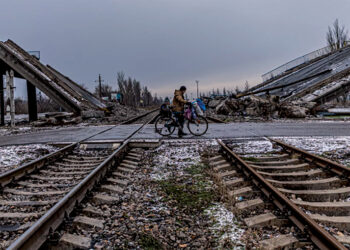The coming disintegration of Russia is not a pastime or a manifestation of “wishful thinking”, as admirers of the Putin regime think – writes Juraj Mesik, a Slovak author and scholar. And many a Western European scholar would answer: that is a bold statement. “2023- The Year the Russian Empire Died” is the title of Mesik’s latest book. Radio Free Europe’s Georgian Service sat down with him to talk about Russia today, one which currently occupies one fifth of the largest state in Europe, and the fact that the vaunted sanctions policy has seemingly failed to starve Russians, demolish the Russian economy, or make Putin more pliable.
“On the long term, I think it’s pretty clear with the diminishing returns from the export of fuels, oil and natural gas and the coal, that the economy of Russia will go downhill,” he tells us. “And with a very rapid demographic decline, and the change in internal composition of the Russia’s Empire’s demographic structure, many other factors are playing in that direction. Now, why I think that the sudden collapse of the Russian Empire is possible – I’m not so old, but I have lived through the fall of communism, the disintegration of Czechoslovakia, and I witnessed the fall of the Soviet Union. And the West was not prepared for any of it – it is very natural that we did not expect the changes, we simply learned to live in a kind of status quo. Even when we did not like that status quo, we considered it a standard and something which would continue. Surprisingly, the Western analysts did not envision the collapse of the Soviet Union. It took them by surprise. So even if I’m wrong, I think that it is absolutely necessary that the Western decision-making politicians are not confronted with the eventual collapse of Russia unprepared. I think that it will happen very soon. Actually, it is already happening. In the future, the historians will say that 2023 was the year the Russian Empire ended, even if it might technically continue, maybe a few more months or even a few more years.
“The Russian Empire’s rests on just a few foundation poles, and all of them are very shaky. One is surplus of income from the export of natural resources, the second is their military might, which keeps oppressed nations paralyzed, and third is, of course, the Russian great power mentality there, which I think is paranoia. There is this famous saying that “it’s impossible to understand Russia.” It can be understood, but you have to look at Russia through the eyes of a psychiatrist. It is a society which is a victim of mass psychosis, which lives in a paranoid world, in a parallel universe. And that parallel universe is collapsing. And it will collapse when they suffer major military defeat – fundamentally, throughout history, whenever Russia was defeated, in 1905, in Japan, or in 1817, in the First World War, or in Afghanistan, the Empire was shaken to the ground and started to collapse.”
When you say there is a military defeat forthcoming, how much is this imminent collapse of Russia contingent on outright military defeat in Ukraine?
I think it is inevitable. Obviously, we had the expectation that it would be faster, that the Russian army would collapse during the summer counter-offensive of the Ukrainian army. That did not happen yet. From the military perspective, it is not so difficult to understand. But it’s very difficult to imagine a scenario under which the Russian army could prevail in this war.
What about a stalemate, where Russia manages to keep some parts of Donbas and Crimea, and the other territories go back to Ukraine alongside a ceasefire? Would Russia collapse in that scenario?
That would be a military defeat for Ukraine, but I don’t consider it likely. It’s really very, very difficult to imagine that Russia will win the war over Ukraine while supported by the coalition of Western countries. Yes, that support is very slow, frustratingly slow. It comes with various limitations, but nevertheless, step by step, it moves forward. I’m pretty sure that Ukraine will liberate their territory, but even the full liberation of the Ukrainian territory is not what I would consider a true victory for Ukraine. Even if they manage to get back to the 1993s borders, that will not be the inevitable end of the Russian Empire: if Russia survives that military defeat as one country, then we will be back to what Germany went through in 1918, when Germany was defeated from the Western perspective, but not from the German perspective. And if the West allows Russia to be defeated, but not in the Russian eyes, then the next generation of Ukrainians and Europeans will likely face yet another war, because revanchism will come to play in in Russia.
The real defeat of Russia will be a breakdown of the Russian Empire. That is the defeat of Russia, and that is victory of Ukraine. Demilitarization and denazification should happen, but in Russia, and that can only really happen after the real defeat of Russia. Otherwise, they do not have internal resources for mental change; they are not able to heal themselves from all those delusions they live in. If they are left alone after a military defeat, they will continue to live in their delusions, they will say that, no, it was not Ukrainians who defeated them, it was the Americans and the internal enemies who backstabbed them. They will simply not accept the new reality and they will continue to live in their delusions.
How crucial is the Western resilience in achieving that outcome, the collapse of Russia, if the West’s current approach to Ukraine is anything to go by?
The West is certainly able to achieve these goals. The problem is that most of the leaders in the West are not aware of this situation and are not thinking about it. And the purpose of my book is really to catalyze and provoke debate about it. There are masses of academics, of politicians, of diplomats, who learned to deal with Russia, and to play Russian games with Russians, and they became good at it, and their living is based on playing those games. And for those people, learning a new game is not something they can do easily.
It’s very easy to imagine that the collapse of Russia would result in civil war inside Russia, and the West is not very keen on that scenario.
The West is not keen on any deep changes. It is the nature of democracies – democracies are very much concerned by big changes. Big changes are forced upon democracies, but people do not vote for them as such. I don’t think the collapse of Russia must inevitably be a bloody game. It will be a bloody game if it is uncontrolled and not managed, if the West washes its hands of Russia as it did in the 90s. That’s why I said I think the West should be preparing to manage the disintegration of Russia. And the purpose is not to punish Russia for what they did; the purpose is actually to avoid the more tragic outcomes of the freefall disintegration of Russia, which I can imagine would lead to events similar to the 1917 revolution.
You write that if the Soviet Union didn’t turn into an all-out battlefield with nuclear-armed factions vying for power, neither should the imminent collapse of Russia result in that. Is that a foolproof conclusion?
I think the risk of the nuclear arms is much lower than then. It’s difficult to exclude it totally, but it is a very, very low risk. The Western precision weapons are much more advanced. And in the case of the threat of misuse of nuclear weapons, the West is in a position to destroy the Russian nuclear arsenal with conventional precision guided weapons. I think the Western military intelligence knows exactly where those weapons are located, and what is needed to make them inoperable.
After the Budapest Memorandum 30 years ago, not all countries gave up their nuclear arsenal. How do you convince all those new states that would pop up in the event of Russia’s collapse to give them up?
The stick and carrot strategy. If the West states the policy that it will recognize only new states that agree to certain conditions, de-nuclearization being one of them, then the local leaders will be forced to make a decision whether they want to be recognized by the West as an independent country, or whether they want to operate outside of the Western world. And then there are various economic tools and privileges, or lack of privileges. The West can develop very well-functioning tools to push for denuclearization.
How many new countries do you envisage will pop up after Russia’s collapse?
I think, going from west to east, in the North Caucasus there is a strong tendency towards independence. We know that historically there was a Mountain Federation, short lived, sure, but it was short-lived because the Russian army came. Is it possible to re-establish a New Mountain Republic? That’s a question I don’t have an answer for, but can you imagine Chechens staying in Russia if Russia were to collapse? And once Chechnya becomes independent, it will be a domino scenario for other North Caucasus nations, like Dagestan, which is multi-ethnic but has a sizeable population of 3 million. And then Bashkortostan very likely, Tatarstan, and the question is whether Tatarstan would try to become a Federation of the other Turkic and ugro-finn nations of the Volga region or not. The Yakuts apparently have a drive for independence. So those would be my candidates for ethnic states. But then they may be more.
Let’s move on from the ethnic states, let’s say sovereign entities, to the territories that would go to other countries.
Obviously Kaliningrad, or Konigsberg, to be more precise, is an obvious pick. There’s no reason for the existence of an enclave of the Russian Empire in Central Europe, it’s just a remnant of Stalin’s policy. I think a more reasonable approach would be to integrate part of Konigsberg to Poland and part to Lithuania.
Then, further north, you have the occupied territories of Finland – Karelia. And then you have the question of whether even the parts of Russia where the Russian population dominates want to be a part of one whole. I do not see any reason why a citizen of Sankt Petersburg, if the Russian Empire collapses, would necessarily want to exist under Moscow’s rule. It is a large city with the potential for statehood, and history to back those ambitions up.
Then you have the Kuril Islands that are occupied by Russia which were never recognized by the Japanese. After the collapse of Russia, Japan will take over those islands, together with Sakhalin. Then there are territories in the east of Russia that were historically part of China, and if China decides that they want those territories back, I would consider that an absolutely legitimate request.
If you consider that legitimate, then what makes Russia’s imperial war of conquest illegitimate? Russia has internationally recognized borders. One of the main arguments against Russia is that it violates the internationally recognized borders of other countries. How does China doing the same against Russia make it right?
By declaring parts of Ukraine as Russian territories, officially, through the Russian Constitution, they violated the international order respected for many decades. And a country which does this chooses to play a game of not respecting international borders, and they should be treated as those who do not respect international borders. It’s a fair game. Yeah. Let there be a new status quo after the war, which will then be codified internationally.
Further south, we have the territories that are not officially part of the Russian Federation, but which are definitely occupied by it: Moldova’s Transnistria and Georgia’s Abkhazia and South Ossetia.
Those are parts of Moldova and Georgia and that’s absolutely unquestionable: they will return to the countries from which they were stolen.
Music to the ears of many Moldovans or Georgians. But let’s imagine a scenario where Russia does indeed collapse and Abkhazia, for example, says, “we don’t want to rejoin Georgia.” What happens there?
With Abkhazia, I think it’s a little bit more complicated. And I do not have a specific answer. I really don’t know enough about the dynamic between Abkhazia and Georgia, but I think that it should return to Georgia, because the independence or quasi independence of Abkhazia was never recognized by the international community,
By whatever mean means necessary?
Without the Russian influence, there will much better conditions for patient negotiation, taking into consideration the needs of refugees who were expelled from those territories. I really don’t know to what degree their national ethnic rights were or were not respected, but I think that without the Russian influence, and with the wise mediation of Western powers, there will be gradual progress towards some settlement and peace accepting.
In 1945, the Germans were a hated nation in Central Europe. Imagine that the Poles and Germans were able to come to peace after what happened there. So I think that the Abkhaz and Georgians, though without really understanding the details of this dynamic, without the Russians continually adding fuel to the fire, will have a very good chance to find gradual settlement.














